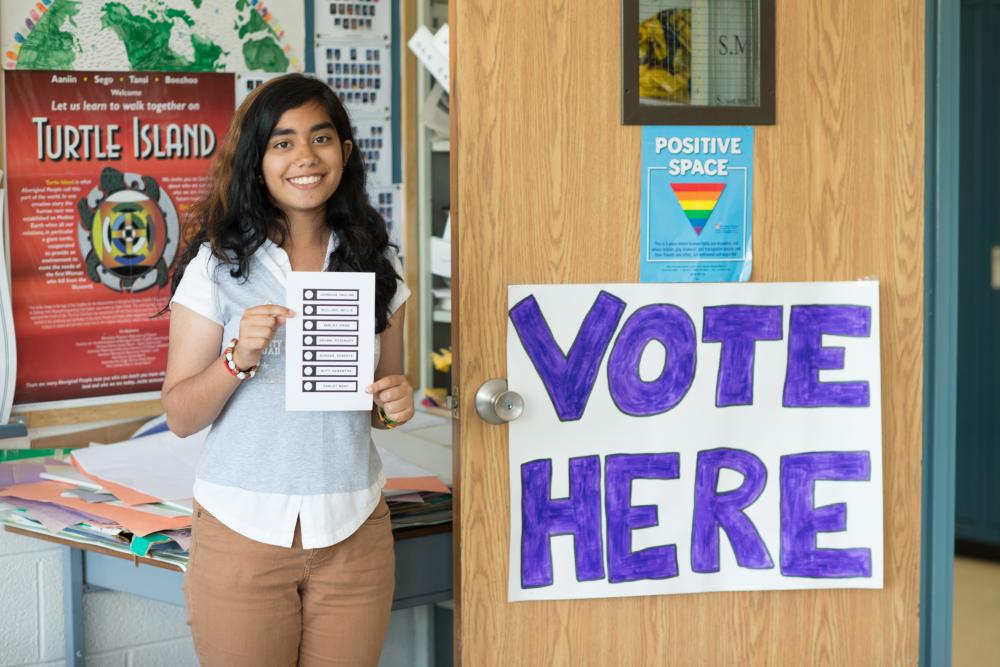
CIVIX, Civics, and Student Engagement in Democracy
Getting students to become active agents of inquiry is not always something that comes to mind when the topic is politics. But it is never too soon to engage students in learning about Canadian political processes and the rights and responsibilities of voting.
In a time when there are so many media platforms that students access along with an increase of “fake news,” it is critical that elementary educators teach media literacy skills . Our students need to become excited, not cynical about the world of decision making and politics. Developing a unit for your classroom can be daunting, but it need not be so. Fortunately there is a non-partisan, Canadian organization that can assist educators with helping students become active citizens and voters.
CIVIX is a Toronto based organization that has been organizing Student Vote for over 15 years. Using their teacher guide and resources, your classroom can become an activity-based inquiry centre where the world of politics and authentic learning experiences cancome together in your school.
CIVIX will be organizing a Student Vote parallel election for elementary and secondary schools coinciding with the Ontario provincial election on June 7, 2018. Students from across the province will learn about the electoral process, engage in the campaign and cast ballots on the official local candidates. This will be the twelfth Student Vote project coordinated in Ontario. Educators are invited to register their school to receive free educational materials and election supplies.
The CIVIX teacher guide applies to all divisions in elementary schools. The Ontario Curriculum: Social Studies1-6, Geography and History 7-8 has strands that connect directly to the upcoming provincial election.
Grade 3 Social Studies strand:
B3.1 demonstrate an understanding that Ontario is divided into different municipal or regional entities (e.g., cities, towns, townships, villages, counties, reserves) and that local governments within these entities provide specific services and regulate development according to local needs (e.g., elected municipal governments deal with local issues and needs; reserves have band councils and chiefs; different municipalities have different laws or policies relating to land development) Students can investigate “What do political candidates say to people in a municipality to get their votes?
Grade 4 Social Studies strand:
A3.7 describe how two or more early societies were governed. Students can investigate how early governments compare to current governments.
Grade 5 Social Studies strand:
The Role of Government and Responsible Citizenship. Why do we need government? Why are there different levels of government? What services should governments be responsible for?
B1 Citizens and governments need to work together in order to be able to address issues effectively and fairly.
B3 To be active and effective citizens, Canadians need to understand their rights and responsibilities as well as how governments work.
B3.7 describe some different ways in which citizens can take action to address social and environmental issues (e.g., by determining the position of their local candidates on various issues and supporting/voting for the one whose position they agree with; Sample questions: “How can a person determine the position of local candidates or party leaders on issues of importance?”
Grade 6 Social Studies strand:
A1.2 evaluate some of the contributions that various ethnic and/or religious groups have made to Canadian identity. Sample questions: “Who are the founding nations of Canada? For whom is the concept of ‘founding nations’ troubling? Why?” “In what ways is the Canadian system of government similar to that of Great Britain? What accounts for the similarities? Do you think Canada’s status as a constitutional monarchy is important to our identity as Canadians? Why or why not?”
Grade 7 History
B2. use the historical inquiry process to investigate perspectives of different groups on some significant events, developments, and/or issues that affected Canada and/or Canadians between 1800 and 1850
B2.1 formulate questions to guide investigations into perspectives of different groups on some significant events, developments, and/or issues that affected Canada and/or Canadians between 1800 and 1850 ( the idea of and the actual transformation to Responsible Government)
Grade 8 History
A1. assess the impact of some key social, economic, and political factors, including social, economic, and/or political inequality, on various Canadians between 1850 and 1890 as well as on the creation and expansion of the Dominion of Canada ( Have students locate the actual votes cast in parliament in both Canada West and Canada East to discover the actual response to accepting Confederation)
As an educator consider planning a civics unit for your classroom in May 2018 so that your students can run a school wide Student Vote.
Scott Montgomery is a member of the Upper Grand Teacher Local.